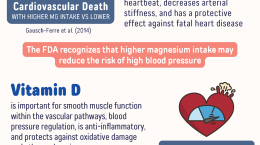Published on November 12, 2024
Weight gain, blood sugar dysregulation, high blood pressure and cholesterol levels… what is cardiometabolism, why does it matter for our health, and can optimizing vitamin D help?
Key Points
- Metabolic syndrome is a condition that often results in excess weight gain, high blood sugar, high cholesterol, and blood pressure dysfunction; if left uncorrected, metabolic syndrome can lead to conditions such as obesity, diabetes, cardiovascular disease, liver disease, and gynecological disorders. Cardiometabolism describes the effects of our metabolic health on cardiovascular function.
- A meta-analysis of 99 randomized controlled trials on vitamin D, involving 17,656 participants, found a clear association between vitamin D intake and specific markers of cardiometabolic health, including blood pressure, cholesterol levels, blood sugar markers.
- The study also confirmed the need for personalized vitamin D dosages, demonstrating that individuals with higher BMI and lower vitamin D levels at baseline would likely require higher doses of vitamin D over longer periods of time; magnesium intake is also important, as is omega-3 status.
 Metabolic syndrome is a condition that often results in excess weight gain, high blood sugar, high cholesterol, and blood pressure dysfunction. If left uncorrected, metabolic syndrome can lead to conditions such as obesity, diabetes, cardiovascular disease, liver disease, and gynecological disorders.
Metabolic syndrome is a condition that often results in excess weight gain, high blood sugar, high cholesterol, and blood pressure dysfunction. If left uncorrected, metabolic syndrome can lead to conditions such as obesity, diabetes, cardiovascular disease, liver disease, and gynecological disorders.
Cardiometabolism describes the effects of our metabolic health on cardiovascular function. Our cardiometabolic health heavily influences the risk of certain cardiovascular diseases, such as heart attack and stroke. According to a study published in 2022 only 6.8% of US adults have optimal cardiometabolic health (less than one person out of 14!), and that rate has been steadily declining.
Findings from a New Meta-Analysis on Vitamin D and Cardiometabolism
Previous studies have demonstrated how optimizing vitamin D, omega-3s, and magnesium status can help improve cardiometabolic measures, such as blood pressure, cholesterol levels, and blood sugar regulation (see below).
A new meta-analysis by An et al. looked at data from 99 randomized controlled trials on vitamin D, involving 17,656 participants, and found a clear association between vitamin D intake and specific markers of cardiometabolic health. In analyzing the studies, they found that an average intake of 3320 IU vitamin D per day was significantly associated with several cardiometabolic benefits when compared to placebo, including
- better systolic and diastolic blood pressure
- lower overall cholesterol levels
- lower HbA1c levels (better blood sugar regulation)
- lower fasting blood glucose and insulin levels
According to the paper,
“Vitamin D supplementation resulted in a significant reduction in all glycemic parameters across the entire study population.”
Study Design Analysis
The review also focused on the importance of study design for vitamin D trials, such as the consideration of baseline and achieved vitamin D levels, and doses appropriate for body mass index (BMI), age, and ethnicity. Study duration was also identified as an important factor when analyzing findings and results, and magnesium status and intake was noted for consideration as well. In other words, the study confirmed the need for personalized vitamin D dosages, demonstrating that individuals with higher BMI and lower vitamin D levels at baseline would likely require higher doses of vitamin D over longer periods of time.
“The findings of this study underscore the need for personalized vitamin D intervention strategies that comprehensively account for individual patient characteristics (such as ethnocultural background, age, BMI, and circulating 25[OH]D level), intervention dosage, and intervention duration to optimize cardiometabolic health outcomes.”
Findings from Previous Studies
Lower HbA1c Levels Found Among T1D Adults Taking More Vitamin D
 Several studies have found a linear, dose-response relationship between vitamin D intake and HbA1c levels among type 1 diabetics, indicating better glycemic control with improved vitamin D status.
Several studies have found a linear, dose-response relationship between vitamin D intake and HbA1c levels among type 1 diabetics, indicating better glycemic control with improved vitamin D status.
Read More
Magnesium Status and Body Fat Measurements Shown to be Significantly Related
 A study found that, as magnesium levels increased, fat mass decreased in a significant inverse association for each of the measurements taken, with no differences between genders. The study also found a significant association between serum magnesium and metabolic syndrome, characterized by a combination of elevated waist circumference, high blood pressure, low HDL cholesterol, high triglycerides, and/or elevated fasting glucose.
A study found that, as magnesium levels increased, fat mass decreased in a significant inverse association for each of the measurements taken, with no differences between genders. The study also found a significant association between serum magnesium and metabolic syndrome, characterized by a combination of elevated waist circumference, high blood pressure, low HDL cholesterol, high triglycerides, and/or elevated fasting glucose.
Read More
Could Increasing Your Omega 3 Status Help Maintain a Healthy Weight and Mood?
 Study authors stress the importance of personalized omega-3 dosing for individuals to achieve a potential therapeutic action in addressing depression, obesity, and metabolic dysregulation; this includes measuring the omega-3 status to determine an optimal dose and monitoring levels of inflammation, which can be done through a combination of testing the Omega-3 Index, the AA:EPA Ratio, and levels of CRP.
Study authors stress the importance of personalized omega-3 dosing for individuals to achieve a potential therapeutic action in addressing depression, obesity, and metabolic dysregulation; this includes measuring the omega-3 status to determine an optimal dose and monitoring levels of inflammation, which can be done through a combination of testing the Omega-3 Index, the AA:EPA Ratio, and levels of CRP.
Read More
Analysis by Vitamin D Level: A 76% Decreased Risk of Type 2 Diabetes Among those with Prediabetes
 Many individuals are unaware that they have prediabetes or are already diabetic. Watch this short video on a recent meta-analysis showing how vitamin D reduces the risk of type 2 diabetes and prediabetes, and take steps to measure your status and reduce your risk!
Many individuals are unaware that they have prediabetes or are already diabetic. Watch this short video on a recent meta-analysis showing how vitamin D reduces the risk of type 2 diabetes and prediabetes, and take steps to measure your status and reduce your risk!
Read More
How Are Your Levels of the Above??
Check your vitamin D, omega-3, HbA1c and magnesium levels today as part of the vitamin D*action project, and add the Ratios for more about how to balance your Omega-3s and 6s for better inflammation control.
Measure your:
- Vitamin D
- Magnesium PLUS Elements
- Omega-3 Fatty Acids
- hsCRP (for Inflammation)
- HbA1c (for Blood Sugar)
- and more
Did you know that each of the above can be measured at home using a simple blood spot test? As part of our ongoing research project, you can order your home blood spot test kit to get your levels, followed by education and steps to take to help you reach your optimal target levels. Start by enrolling and ordering your kit to measure each of the above important markers, and make sure you are getting enough of each to support better mood and wellbeing!
Build your custom kit here – be sure to include your Omega-3 Index along with your vitamin D.
Start Here to Measure Your Levels






